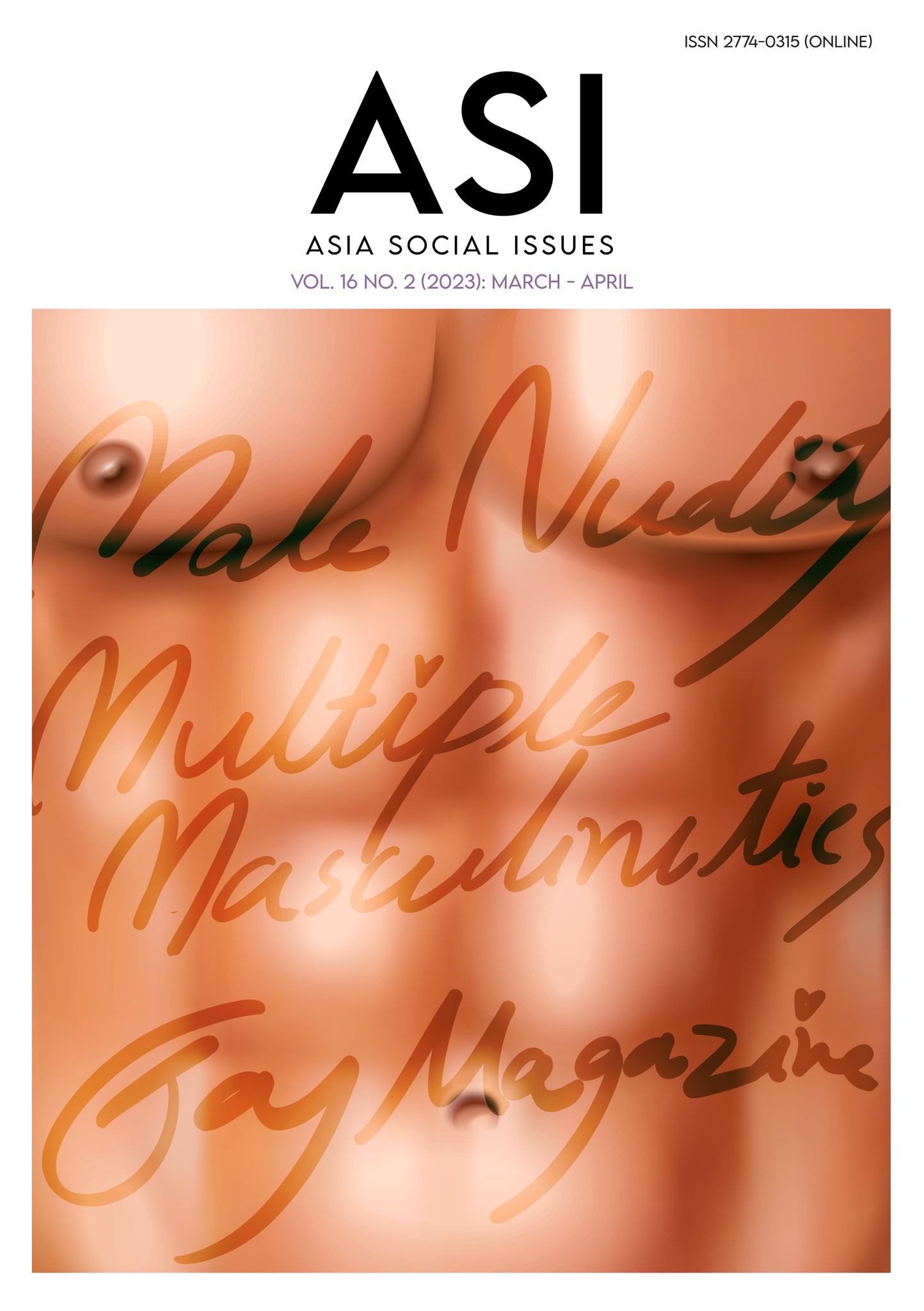Discourse Structure of Conversation in Hone-Krasae
Main Article Content
Abstract
This research aims to analyze the discourse structure in Hone-Krasae by using the ethnography of communication. The authors collected information by selecting 20 officially uploaded videos with 1 million views or more on www.youtube.com from March 1st, 2021 - March 1st, 2022. The authors found that the discourse structure of Hone-Krasae consisted of three parts: greeting and informing the audience and guests about dramatic issues from social media, questioning to find the truth and solve the problem, and ending the program with a short closing speech. The objective of Hone-Krasae is to demonstrate guests’ perspectives to uncover the stories. The linguistic devices and various tones of the host’s language-Kanchai Kamneodploi are the important communicating tool in the show, including asking the same question and expressing his feelings throughout any situation, along with legal basis and his opinions sometimes. Thus, Hone-Krasae is an exciting program to explore its discourse structure with the ethnography of communication.
Article Details

This work is licensed under a Creative Commons Attribution-NonCommercial-NoDerivatives 4.0 International License.
Copyright: CC BY-NC-ND 4.0
References
Chatchaipruk, J., & Boonwan, Kh. (2019). Discourse structure and language strategy in unknown interlocutor “Tor Pak Tor Kham Tidfaidaeng”. Lajournal, 2(2), 47-73.
Newmeyer, F. J. (1989). Linguistics: The Cambridge survey: Volume 4, Language: The Socio-Cultural Context. Cambridge University Press.
Hone-Krasae. (2021). The undertaker cries, Covid-19 dead victims have no cremation rights anywhere. Retrieved from https://www.youtube.com/watch?v=oBSPgjuc4qU
Hone-Krasae. (2021). Women caught in a brutal slap fight. Retrieved from https://www.youtube.com/watch?v=tzITHX4Y2nc
Hone-Krasae. (2021). Can’t stand anymore of Isan racism. Time to hunt down the racists. Retrieved from https://www.youtube.com/watch?v=Un2tm_Htn5A
Hone-Krasae. (2021). How about naming yourself Sorapong? A Fight for a Brand-named Bag. Will Pay 2 million, and Stop being a Ladyboy Too, If It’s Real. “The Brand-Name Bag War”. Retrieved from https://www.youtube.com/watch?v=K6DCkGnyRZw
Hone-Krasae. (2021). A woman killed in a ruthless robbery. Retrieved from https://www.youtube.com/watch?v=DWhPIQd8eCI
Hone-Krasae. (2021). A husband asks to clear things up with his wife on the issue of property damages caused by jealousy. Retrieved from https://www.youtube.com/watch?v=cTakH7Ll9iA
Hone-Krasae. (2021). What makes Lung Pol fails? Retrieved from https://www.youtube.com/watch?v=VSfIt8_3jvE
Hone-Krasae. (2021). Why leave the monkhood? With “Paivan Vannabutr”. Retrieved from https://www.youtube.com/watch?v=NzZoARA3WsA
Hymes, D. H. (1972). Models of the interaction of language and social life (pp. 35-71). In Gumperz, J. J., & D. Hymes, D. (Eds.). Directions in sociolinguistics: The ethnography of communication. New York, United States of America: Holt, Rinehart & Winston.
Khanla, K., & Sroikudrua, Th. (2021). Discourse structure in online advertising for health supplement products. In Proceedings of the 22nd academic conference on the presentation of graduate studies. Khon Kaen, Thailand: Khon Kaen University.
Ongwuttiwat, S. (2021). A discourse of entertainment news on “dtâidtiangdaa-raa” Facebook page: A discourse analysis and pragmatics study. Thai Language and Literature, 38(1), 16-55.
Pewporchai, P., & Arthit, K. (2021). Structure of conversational discourse and cultural reflections in “Krua Chan Soong” hosted by Mom Luang Kwanthip Taewakul. Journal of MCU Nakhondhat, 8(9), 116-129.
Pimol, P. (2019). Strategies of language use of Theema Kanchanapairin in the news program “Jud Sud Took Kwaam Jing”. Journal of Liberal Arts Maejo University, 7(2), 132-141.
Polpong S, Laphawatthanaphan B, & Nuannet P. (2007). Communication arts knowledge series. Bangkok. Bangkok, Thailand: Chulalongkorn University.
Pradittasorn, P. (2017). Conversational discourse of news reporting in “Rueng Lao Chao Nee” and “Rueng Lao Sao Arthit” (Master’s thesis). Thailand: Prince of Songkla University.
Suthiyothin N. (2014). Criminal law and advanced criminology. Bangkok, Thailand: Sukhothai Thammathirat University.
Tantimala, Ch. (2018). Constructing the body of knowledge through cultural research-based on grounded theory in ethnography approach. Journal of Behavioral Science for Development, 10(1), 17-22.
Thapthan, S. (2020). The communication process in the “Mind Training” column by Vanessa Race: The ethnography of communication approach. In Proceedings of the 14th National and International Research Presentation Symposium. Bangkok, Thailand: King Mongkut’s Institute of Technology Ladkrabang.


